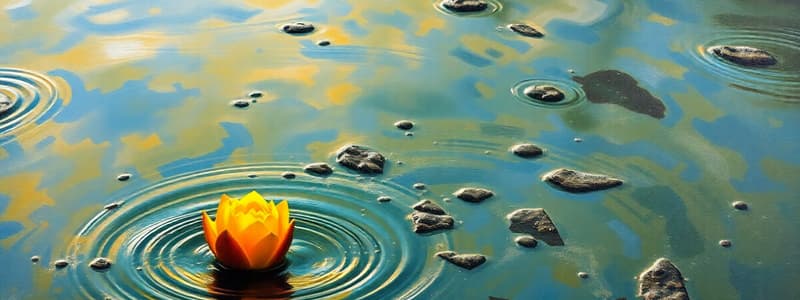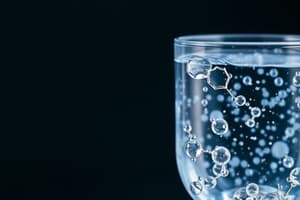Podcast
Questions and Answers
Which class of molecules is characterized by having both hydrophilic and hydrophobic properties?
Which class of molecules is characterized by having both hydrophilic and hydrophobic properties?
- Amphipathic compounds (correct)
- Hydrophobic compounds
- Ionic compounds
- Aromatic hydrocarbons
What is primarily responsible for NaCl's high solubility in water?
What is primarily responsible for NaCl's high solubility in water?
- The ionic nature of NaCl
- Formation of hydration shells (correct)
- High density of water molecules
- Presence of hydrogen bonds
Which of the following statements about hydrophilic substances is true?
Which of the following statements about hydrophilic substances is true?
- They are always ionic compounds.
- They have higher boiling points than hydrocarbons.
- They tend to be water-soluble. (correct)
- They cannot form hydrogen bonds.
How does the high dielectric constant of water affect ionic compounds?
How does the high dielectric constant of water affect ionic compounds?
What term describes substances that do not dissolve well in water?
What term describes substances that do not dissolve well in water?
Osmosis refers to the movement of water across a semi-permeable membrane influenced by what factor?
Osmosis refers to the movement of water across a semi-permeable membrane influenced by what factor?
Which type of compound is primarily formed when water hydrates cations and anions in solution?
Which type of compound is primarily formed when water hydrates cations and anions in solution?
Which of the following properties is altered by solutes in a solvent?
Which of the following properties is altered by solutes in a solvent?
What happens to the electrostatic interactions of ions when dissolved in water?
What happens to the electrostatic interactions of ions when dissolved in water?
Why do nonpolar and nonionic compounds remain undissolved in water?
Why do nonpolar and nonionic compounds remain undissolved in water?
What percentage of total human body weight is constituted by water?
What percentage of total human body weight is constituted by water?
Why do polar molecules dissolve readily in water?
Why do polar molecules dissolve readily in water?
What is the lifetime of a hydrogen bond in water?
What is the lifetime of a hydrogen bond in water?
Which of the following bonds has the highest dissociation energy?
Which of the following bonds has the highest dissociation energy?
Which statement accurately describes nonpolar molecules in water?
Which statement accurately describes nonpolar molecules in water?
Which types of compounds typically form hydrogen bonds with water?
Which types of compounds typically form hydrogen bonds with water?
What structural arrangement allows water molecules to form hydrogen bonds?
What structural arrangement allows water molecules to form hydrogen bonds?
How does water act as a solvent for biological processes?
How does water act as a solvent for biological processes?
What is a characteristic of hydrogen bonds?
What is a characteristic of hydrogen bonds?
In what way do nonpolar molecules behave in aqueous solutions?
In what way do nonpolar molecules behave in aqueous solutions?
Flashcards are hidden until you start studying
Study Notes
Water
- Water constitutes a significant portion of the human body, ranging from 45% to 75% of total body weight.
- It is distributed both inside cells (intracellular) and outside cells (extracellular).
- Water plays a crucial role in various metabolic processes, including absorption, transport, digestion, and excretion of substances.
Hydrogen Bonds
- Hydrogen bonds are formed between water molecules due to their polarity.
- These bonds provide the forces that keep water in a liquid state at room temperature.
- Hydrogen bonds are relatively weak compared to covalent bonds.
- The lifetime of a single hydrogen bond is fleeting, lasting only a few picoseconds.
- Each water molecule can form hydrogen bonds with up to four neighboring water molecules.
Water as a Solvent
- Water's polarity and ability to form hydrogen bonds make it an excellent solvent.
- Substances that form hydrogen bonds with water, such as alcohols, aldehydes, ketones, and compounds containing N-H bonds, readily dissolve in water.
- Water can also dissolve ionic compounds, such as NaCl, by hydrating and stabilizing the ions, reducing electrostatic interactions between them.
- The high dielectric constant of water further contributes to the solubility of ionic compounds by decreasing the attraction between oppositely charged ions.
- Substances that dissolve in water are considered "hydrophilic," whereas those that don't are called "hydrophobic."
Amphipathic Compounds
- Amphipathic molecules possess both hydrophilic and hydrophobic regions.
- Examples of amphipathic compounds include fatty acids, detergents, and phospholipids.
Micelles and Liposomes
- Amphipathic molecules can form structures like micelles and liposomes in aqueous solutions.
- Micelles have a hydrophobic core with hydrophilic heads facing outwards.
- Liposomes are spherical vesicles with a bilayer membrane of phospholipids, encapsulating a hydrophilic interior.
Solutes and Physical Properties
- Solutes can alter a solvent's physical properties, including:
- Vapor pressure
- Boiling point
- Melting point
- Osmotic pressure
Osmosis
- Osmosis is the movement of water across a semipermeable membrane driven by differences in osmotic pressure.
Studying That Suits You
Use AI to generate personalized quizzes and flashcards to suit your learning preferences.




